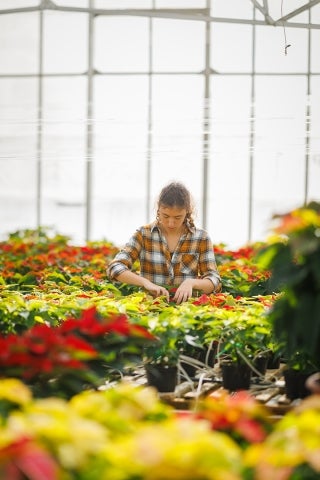Annual Poinsettia Sale Starts Dec. 3
Contact: AnnMarie Cornejo
805-756-2427; ancornej@calpoly.edu
SAN LUIS OBISPO — Cal Poly’s annual poinsettia sale, with thousands of plants and dozens of varieties and colors, will kick off this weekend and be held over two days: Saturday, Dec. 3, and Saturday, Dec. 10, from 11 a.m. to 4 p.m. at the Poly Plant Shop. Each sale date will offer similar varieties and availability.

The flowering holiday plants are grown by students who work in the Plant Sciences Department’s greenhouses. This year’s poinsettia project offers many shades of red, white, pink and other variegated varieties. Sizes range from small plants in 4-inch pots to large poinsettias reaching 3 feet high, in 14-inch pots. Prices range from $10 to $100.
In addition to poinsettias, the Poly Plant Holiday Sale also features student-made wreaths, centerpieces, succulents, ornaments and gifts. Customers are encouraged to bring their own boxes and wagons for transporting larger purchases.
The Poly Plant Shop is on campus off of Via Carta Road. Take the Highland Drive entrance, turn left on Via Carta Road, and go to the top of the hill. For more information, visit Poly Plant Shop or call 805-756-1106.
About Cal Poly’s College of Agriculture, Food and Environmental Sciences
Cal Poly is a nationally ranked, comprehensive polytechnic university. The university’s College of Agriculture, Food and Environmental Sciences is comprised of expert faculty members who take pride in their ability to transform academically motivated students into innovative professionals ready to solve the complex challenges associated with feeding the world in sustainable ways. Students have access to state-of-the-art laboratories, including ranch land, orchards, vineyards and forests, all of which provide the basis for Cal Poly’s Learn by Doing methodology. It is the fifth-largest college of agriculture in the country, with 4,000 undergraduate students.


